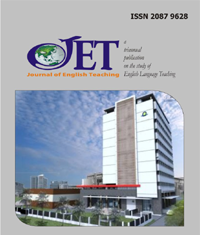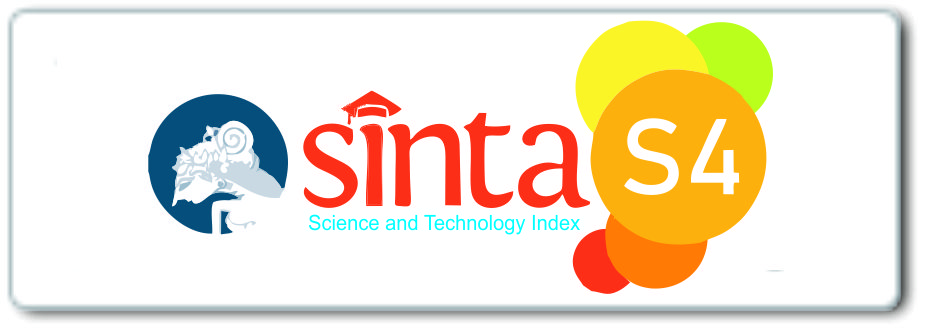Teaching English Writing for Primary Students: Constructivism Views
DOI:
https://doi.org/10.33541/jet.v10i3.6067Keywords:
teaching writing, EFL primary students, constructivism approachAbstract
As one of the productive skills, writing is highly required to be mastered by English as foreign language. Moreover, communication can be occurred not only in spoken form but also in written form. In creating good learning atmosphere for the students, teachers try to use the most appropriate approach to aim the learning goals, especially in mastering the writing skill. Constructivism approach is commonly used by teachers to enhance it. The implement of constructivism in teaching writing emphasize on students’ activity in building knowledge, interacting with others, constructing ideas, presenting critical thinking and collaboration. Those elements from constructivism are also integrated use teaching method that has been implemented by the teachers. However, teaching writing for primary students level is challenging in many context. Therefore, this article presents a closer look of the constructivism views for teaching primary students’ English writing. The implication from this article is hoped to be used as the supplementary information for primary teachers and other researchers on similar topic in teaching writing using constructivism approach.
References
Abdulwahed, M., Nagy, Z., & Blanchard, R. (2009). Constructivist project based learning
design, a cybernetics approach.
Agustini, N. W. W., Artini, L. P., & Padmadewi, N. N. (2019). English
teacher’perceptions and classroom practices on constructivism values in primary schools in Badung Regency. Jurnal Pendidikan Bahasa Inggris Indonesia, 7(2).
AL-Ghazo, A., & Al-Zoubi, S. M. (2018). How to develop writing skill through
constructivist design model. International Journal of Business and Social Science, 9(5), 91-98. https://doi.org/10.30845/ijbss.v9n5p11
Algahtani, F. (2017). Teaching students with intellectual disabilities: Constructivism or
behaviorism?. Educational Research and Reviews, 12(21), 1031-1035. https://doi.org/10.5897/err2017.3366
Aziz, M. N. A., & Yusoff, N. M. (2018). Using portfolio to assess Rural young learners’
writing skills in English language classroom. MOJES: Malaysian Online Journal of Educational Sciences, 3(4), 46-54.
Aziz, M. N. A., & Yusoff, N. M. (2016). Improving process writing with the use
authentic assessment. International Journal of evaluation and Research in Education, 5(3), 200-204. https://doi.org/10.11591/ijere.v5i3.4539
Becker, C., & Roos, J. (2016). An approach to creative speaking activities in the young
learners’ classroom. Education Inquiry, 7(1), 27613. https://doi.org/10.3402/edui.v7.27613
Bland, J. (2015). Drama with young learners. Teaching English to young learners, 22(1),
-238. https://doi.org/10.5040/9781474257145.ch-013
Dagar, V. & Yadav, A. (2016). Constructivism: A Paradigm for Teaching and Learning.
Arts and Social Sciences Journal, 7(4).
Erlina, D., Retno, W., Holandyah, M., Marzulina, L., & Herizal, H. (2023). The authentic
materials for teaching English to young learners: Teachers’ Perception. Edukasi: Jurnal Pendidikan dan Pengajaran, 10(1), 51-61. https://doi.org/10.19109/ejpp.v10i1.16665
Glasersfeld, E., V. (1982). An interpretation of Piaget's constructivism. Revue
International De Philosophie, 612-635.
Galgalo, K. G., Yasin, A. A., Tuna, Z. A., Shoko, D. A., & Aga, G. (2020).
Investigating the implementation of constructivist teaching techniques, challenges and opportunities of an English foreign language teacher in Beseka secondary school, grade nine writing class in focus. Journal of Advances in Education and Philosophy. doi:10.36348/jaep.2020.v04i03.001
Gangwar, S. (2017). Effectiveness of project based learning (constructivist learning
approach) on students achievement in science at secondary level. Educational Quest, 8(3), 737-741.
Graham, S., & Harris, K. R. (1994). Implications of constructivism for teaching writing
to students with special needs. The Journal of Special Education, 28(3), 275-289. https://doi.org/10.1177/002246699402800304
Hedberg, K. (2010). Authentic games in the classroom: An approach to teaching
grammar to young learners. https//www. usp. ac. jp>2010-I Hedberg.
Heinitz, S. M. (2012). The effect of using an authentic writing task on students’
attitudes toward writing. Master Thezis), Martin Luther College, Minnesota.
Huang, H. W., Li, Z., & Taylor, L. (2020, May). The effectiveness of using grammarly
to improve students' writing skills. In Proceedings of the 5th International Conference on Distance Education and Learning (pp. 122-127). https://doi.org/10.1145/3402569.3402594
Hyland, K. (2003). Genre-based pedagogies: A social response to process. Journal of second language writing, 12(1), 17-29. https://doi.org/10.1016/s1060-3743(02)00124-8
Jonassen, D. (1999). Designing constructivist learning environments. In C. Reigeluth
(Ed.), Instructional design theories and models: A new paradigm of instructional theory ,Vol. II, 215-239). Mahwah, NJ: Lawrence Erlbaum
Kamii, C., & Ewing, J. K. (1996). Basing teaching on Piaget's
constructivism. Childhood education, 72(5), 260-264. https://doi.org/10.1080/00094056.1996.10521862
Li, M., & Storch, N. (2017). Second language writing in the age of CMC: Affordances,
multimodality, and collaboration. Journal of Second Language Writing, 36, 1-5. https://doi.org/10.1016/j.jslw.2017.05.012
Liu, S. H. J., & Lan, Y. J. (2016). Social constructivist approach to web-based EFL
learning: Collaboration, motivation, and perception on the use of Google Docs. Journal of Educational Technology & Society, 19(1), 171-186.
Masrom, U., & Yusof, D. S. M. (2013). English games as a constructivist approach in
project based learning. International Journal of Social Science and Humanities Research (IJSSHR)
Matriano, E. A. (2020). Ensuring Student-Centered, Constructivist and Project-Based
Experiential Learning Applying the Exploration, Research, Interaction and Creation (ERIC) Learning Model. International Online Journal of Education and Teaching, 7(1), 214-227.
Myers, J., Scales, R. Q., Grisham, D. L., Wolsey, T. D., Dismuke, S., Smetana, L.,
Yoder, K., K., Ikpeze, C., Ganske, K., & Martin, S. (2016). What about writing?
A national exploratory study of writing instruction in teacher preparation programs. Literacy Research and Instruction. 55(4), 309-330.
Myhill, D. & Watson, A. (2011). Teaching writing. Becoming a Reflective English
Teacher, 58-72.
Pardede, P. (2024). The Strands and Findings of Recent Research on Technology-enhanced Collaborative Writing in EFL Setting: A Systematic Review. Journal of English Teaching, 10(2), 92-109. https://doi.org/10.33541/jet.v10i2.6035
Piaget, J. (1964). Development and learning. From Piaget Rediscovered. A Report on
the Conference on Cognitive Studies and Curriculum Development, 228-237.
Rahimi, M., & Fathi, J. (2022). Exploring the impact of wiki-mediated collaborative
writing on EFL students’ writing performance, writing self-regulation, and writing self-efficacy: a mixed methods study. Computer Assisted Language Learning, 35(9), 2627-2674. https://doi.org/10.1080/09588221.2021.1888753
Rahmat, N. H. (2014). Constructivism in the ESL writing classroom: A case for
collaborative essay writing. Journal of Creative Practices in language Learning and Teaching (CPLT), 2(1), 1-15.
Schcolnik, M., Kol, S., & Abarbanel, J. (2006). Constructivism in theory and in
practice. In English teaching forum (Vol. 44, No. 4, pp. 12-20).
Schmidt, H. G., Rotgans, J. I., & Yew, E. H. (2019). Cognitive constructivist
foundations of problem‐based learning. The Wiley Handbook of problem‐based learning, 25-50. https://doi.org/10.1002/9781119173243.ch2
Seow, A. (2002). The writing process and process writing. Methodology in language
teaching: An anthology of current practice, 315, 320. https://doi.org/10.1017/cbo9780511667190.044
Setyowati, L. (2019). Authentic materials for efl writing: Why and
how?. In Proceeding of International Seminar Enrichment of Career by Knowledge of Language and Literature (Vol. 7, No. 01, pp. 42-48).
Shaaban, K. (2001). Assessment of young learners. In English teaching
forum (Vol. 39, No. 4, pp. 16-23).
Srikan, P., Pimdee, P., Leekitchwatana, P., & Narabin, A. (2021). A problem-based
learning (PBL) and teaching model using a cloud-based constructivist learning environment to enhance Thai undergraduate creative thinking and digital media skills. International Journal of Interactive Mobile Technologies, 15(22), 68-83. https://doi.org/10.3991/ijim.v15i22.24963
Srour, K., Aqel, M., & Shawish, J. I. (2021). Enhancing EFL secondary school students'
writing skills through a suggested model based on constructivism. Education in
the knowledge society: EKS. https://doi.org/10.14201/eks.23937
Tarnopolsky, O. (2018). Constructivism in ESP teaching at Ukrainian universities. The
TESOL encyclopedia of English language teaching,1-7. https://doi.org/10.1002/9781118784235.eelt0934
Taufik, M., Yusuf, M. J., & Rijal, A. S. (2020). Constructivism learning in writing of
literary works. Elite: English and Literature Journal, 7(1), 102-111. https://doi.org/10.24252/elite.v7i1a9
Vygotsky, L. S. (1978). Mind in society. The development of higher psychological
processes. Cambridge, MA: Harvard University Press. https://doi.org/10.2307/j.ctv26071b0.12
Weigle, S. C. (2007). Teaching writing teachers about assessment. Journal of Second
Language Writing, 16(3), 194-209. https://doi.org/10.1016/j.jslw.2007.07.004
Wichadee, S. (2010). Using Wikis to develop summary writing abilities of students in
an EFL class. Journal of College Teaching & Learning, 7(12), 5-10. https://doi.org/10.19030/tlc.v7i12.951
Wyatt, M. (2023). Constructivism on an award‐bearing in‐service English language
teacher education programme in Oman. TESOL Journal, e727. DOI: 10.1002/tesj.727
Yang, Y.F. (2018). New language knowledge construction through indirect feedback in
web-based collaborative writing. Computer Assisted Language Learning, 31(4), 459-480. https://doi.org/10.1080/09588221.2017.1414852
Zein, M.S. (2017). Language-in-Education Policy on Primary EFL: The Case of
Indonesia. International Journal of Pedagogies and Learning, 12(2), 133-146.
Zulela, M. S., & Rachmadtullah, R. (2019). Constructivism approach in learning to write narrative at elementary school. In 1st International Conference on Innovation in Education (ICoIE 2018) (pp. 287-290). Atlantis Press. https://doi.org/10.2991/icoie-18.2019.64
Zulfah, N., Nanning., & Mujahidah. (2015). Students’ ability in developing Sentences in english paragraph writing. AL-ISHLAH: Jurnal Pendidikan Islam, 13(1), 39-46.
Downloads
Published
Issue
Section
License
Copyrights for articles published in JET are retained by the authors, with first publication rights granted to the journal. The journal/publisher is not responsible for subsequent uses of the work. It is the author's responsibility to bring an infringement action if so desired by the author.





